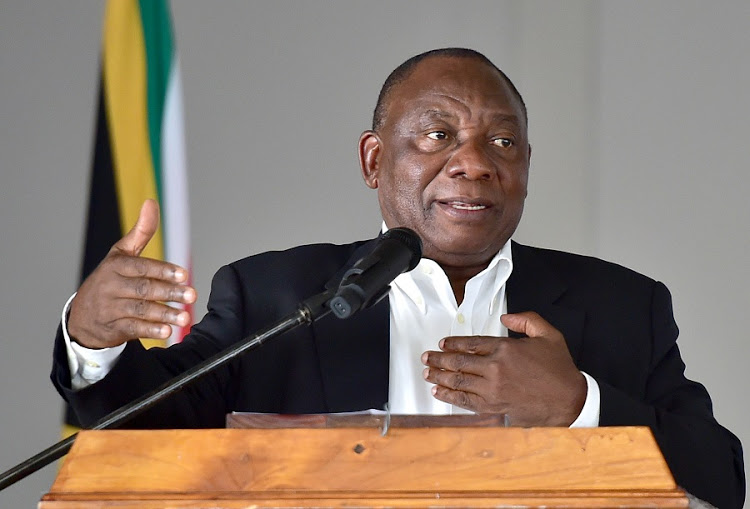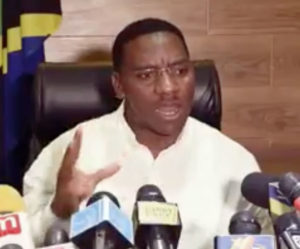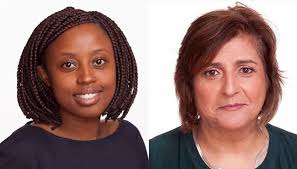S. Africa needs to oppose Tanzania’s anti-gay crackdown
Colin Stewart is a 45-year journalism veteran living in Southern…
Tanzania’s anti-gay crackdown has run into opposition far and wide, but not yet from South Africa, although equal rights for its LGBT citizens are enshrined in the nation’s constitution.

South Africa has even wavered in its support for a South African journalist and press freedom advocate who was expelled from Tanzania last week as she and a colleague were beginning a fact-finding mission authorized by a Tanzanian official.
This week, Johannesburg Pride called on South Africa President Cyril Ramaphosa to pressure Tanzania to recognize the human rights of its LGBTQ+ citizens:
We are urging you to issue an official statement condemning the current arrests and threats to LGBTQ+ people in Tanzania. It is our hope that in doing this South Africa will go on the record standing up for the very basic human right to free expression, association and joyful gatherings.
It is particularly important to raise these issues because we see several African countries enacting even more onerous legislation than the anti-homosexuality Penal Codes of the Colonizers, as well as committing appalling human rights violations based on sexuality and gender identity, to include unlawful arrests, forced medical examinations, imprisonment, government spying and monitoring of social media as a means to hunt people. This has led to persecution and exile for many LGBTQ+ Africans.
The letter also urged Ramaphosa to advocate for decriminalization of homosexuality throughout Africa:
We believe, by virtue of our Constitution and the legacy of Madiba [Nelson Mandela], South Africa is charged with a duty to lead Africa, through our own experience and our historic resolve to uphold human rights, toward the decriminalization of homosexuality for every country on the continent.
Johannesburg Pride proposed that Ramaphosa establish a Presidential Advisory Committee for LGBTQ+ Decriminalization on the Continent of Africa.

An international outcry followed news of the latest expressions of Tanzanian homophobia — Dar es Salaam regional commissioner Paul Makonda’s call for rounding up homosexuals, along with the arrest of 10 allegedly gay men on Zanzibar. Many international organizations responded with protests and reminders of Tanzania’s obligations to live up to its obligations in human rights treaties it has signed:
- The European Union recalled its ambassador to Tanzania.
- The United States state department issued a statement expressing concern about Tanzania’s treatment of sexual minorities and many other members of Tanzanian society. The statement called on “Tanzanian authorities to act decisively to safeguard the rights of civil society organizations, human rights defenders, journalists, health workers, political activists, and all people in accordance with the Tanzanian constitution, the African Charter on Human and People’s Rights, and the country’s international and regional obligations and commitments.”
- Denmark cut off foreign aid to Tanzania, which totaled $9.8 million a year.
- The World Bank suspended its missions to Tanzania because of harassment and discrimination against the LGBT community. It also suspended a planned $300 million educational loan because of a Tanzanian policy of expelling school girls who get pregnant.
- Canadian officials said they were reviewing the country’s relationship with Tanzania, which received $125 million from Canada last year.
But nothing so far from South Africa, though its appeals to Tanzania could be much more influential than pressure from Europe and North America.
Jacqueline Hansen, an official at Amnesty International Canada explained:
“All too often LGBT rights are seen by some countries as a northern, western creation. So sometimes, if the push to protect LGBT rights comes from countries like Canada, it can actually have a negative effect. …
“We know from previous experience that if foreign aid is cut because of LGBT rights, that can actually fuel backlash against LGBT people in that country. So in this case, we would encourage Canada to leverage other channels, to continue engaging in quiet diplomacy.”

South African/American LGBTQI advocacy blogger Melanie Nathan urged Ramaphosa to live up to the principles of equal rights that he espoused before February, when the South African parliament chose him to fill in as president after the resignation of Jacob Zuma.
South Africa’s LGBTQI community joined the rest of the globe in celebrating the election of President Cyril Ramaphosa, who had been a long been a champion of LGBTQ+ rights in the country and the continent.
He must show his strength and assert critical leadership before he misses this opportunity, as Tanzania provides a new opportunity for redemption for South Africa where it can take its leadership responsibility seriously and apply swift action to the current wave of repression. This is the time where President Ramaphosa will be tested – as to whether his support for LGBTQ AFRICA is mere lip service?
South Africa has the promise of this new president who must show leadership, despite the disappointment engendered through the actions, words and silence of his predecessor.
Attacks on press freedom as well as the LGBT community have been features of the repression instituted by Tanzanian President John Magufuli took office in 2015.

The latest example was the expulsion of South African journalist-advocate Angela Quintal and her Kenyan colleague Muthoki Mumo, two press freedom advocates for the New York-based Committee to Protect Journalists who were in Tanzania to investigate harassment of journalists there.
Quintal wrote about their detention and expulsion in the article “My Nasty Encounter with Tanzanian Repression.” Her account concludes with her description of how the South African government stopped supporting her.
At first, she wrote, “The South Africans were superb and even escorted us to the airport and waited until we were safely on the flight” homeward.
But then:
“When Minister Lindiwe Sisulu ignored what we had told the SA High Commission and accepted Tanzania’s false justification that we had been detained for working with tourist visas, I was outraged. I took it more personally than the government-aligned Tanzanite newspaper’s ludicrous attempts to discredit us with a false and defamatory cover story branding us as spies.”
Related articles:
- My nasty encounter with Tanzanian repression by Angela Quintal (November 2018, Daily Maverick)
- U.N. to Tanzania: Your duty is to protect LGBT people (November 2018, 76crimes.com)
- Tanzania plans anti-gay police state, not without opposition
(November 2018, 76crimes.com) - Tanzania hunts homosexuals, threatens ’round-up’ (October 2018, 76crimes.com)
- Donors take aim at Tanzania’s ban on LGBTI health care (January 2018, 76crimes.com)
- Tanzania deports 3 anti-AIDS lawyers for ‘promoting homosexuality’ (October 2017, 76crimes.com)
- Protests surge as Tanzania jails anti-HIV lawyers; no charges (October 2017, 76crimes.com)
- Tanzania cries ‘homosexuality’ to block health-care lawsuit (October 2017, 76crimes.com)
- In Tanzania, 13 people attending a meeting are arrested for allegedly promoting homosexuality; operations of a Global Fund SR are suspended (October 2017, Aidspan)
- Tanzanian AIDS event disrupted by arrest of 20 ‘gay’ suspects (September 2017, 76crimes.com)
- Tanzania threatens to arrest all gay rights activists (June 2017, 76crimes.com)
- LGBT sex worker on Tanzania crackdown: I’m afraid (May 2017, 76crimes.com)
- Inside Tanzania’s AIDS-enhancing anti-LGBT crackdown (April 2017, 76crimes.com)
- Global Fund-supported programs suspended amid Tanzanian government crackdown on LGBT community (March 2017, Aidspan)
- Tanzania ramps up anti-gay panic, risks HIV expansion (February 2017, 76crimes.com)
- Homophobia Explodes In Tanzania, Health Minister Threatens ‘Gay List’ (February 2017, The Advocate)
- Tanzania’s anti-gay crackdown now targets AIDS programs (November 2016, 76crimes.com)
- Seeking to limit gay sex, Tanzania bans lubricants (July 2016, 76crimes.com)




